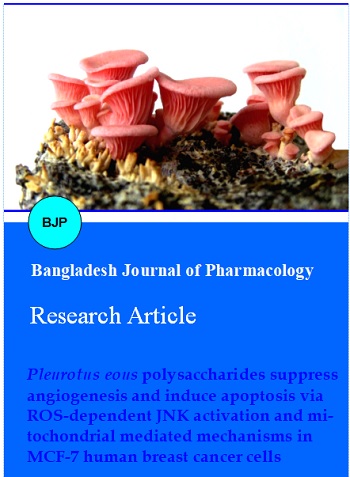Pleurotus eous polysaccharides suppress angiogenesis and induce apoptosis via ROS-dependent JNK activation and mitochondrial mediated mechanisms in MCF-7 human breast cancer cells
DOI:
https://doi.org/10.3329/bjp.v10i1.21153Keywords:
Apoptosis, Angiogenesis, Breast cancer, Mushroom, Pleurotus eous, PolysaccharideAbstract
Breast cancer is one of the most prevalent cancers among women worldwide. Chemotherapy generally leads to drug resistance and severe side effects thus making it crucial to identify and develop highly efficient chemotherapeutic agents. Recently, edible mushrooms have been strongly investigated owing to their nutritional values and bioactive compounds with health benefits. The present study investigates the effects of polysaccharides isolated from the fruiting bodies of oyster mushroom, Pleutorus eous on MCF-7 human breast cancer cells. Viability of MCF-7 following exposure to P. eous polysaccharides (PEP) (50 - 250 µg/mL) were markedly decreased. A raise in the levels of Reactive Oxygen Species (ROS) and apoptotic cell counts were observed following PEP treatment. Futhermore, PEP down-regulated VEGF and Bcl-2 and raised caspase-3, caspase-9, Bax, phospho-JNK expressions and as well caused a significant decrease in mitochondrial membrane potential of MCF-7 cells. Thus, PEP effectively suppressed angiogenesis by down-regulating VEGF, and induced apoptosis.
Downloads
738
324 Read
783

Published
How to Cite
Issue
Section
License
Authors who publish with this journal agree to the following terms:
- Authors retain copyright and grant the journal right of first publication with the work simultaneously licensed under a Creative Commons Attribution License that allows others to share the work with an acknowledgement of the work's authorship and initial publication in this journal.
- Authors are able to enter into separate, additional contractual arrangements for the non-exclusive distribution of the journal's published version of the work (e.g., post it to an institutional repository or publish it in a book), with an acknowledgement of its initial publication in this journal.
- Authors are permitted and encouraged to post their work online (e.g., in institutional repositories or on their website) prior to and during the submission process, as it can lead to productive exchanges, as well as earlier and greater citation of published work (See The Effect of Open Access).
